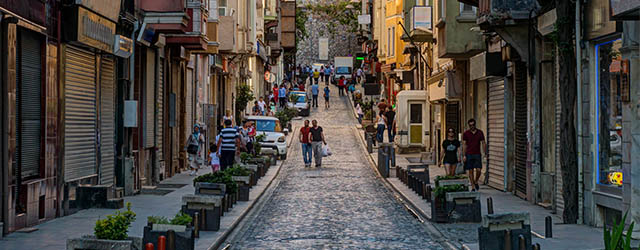Country Report | Turkey is roiled by political uncertainty and slowing growth ahead of November elections.

“Foreign investors like to see strong government and predictability. We’re not going to have either of these in Turkey over the coming months,” says Jonathan Friedman, who follows the country for risk consultants Stroz Friedberg in London.
With new elections scheduled for November 1, that could be an understatement. On June 6, the day before Turkey’s last parliamentary elections, most observers had a pretty clear idea of how things would shake out: The Justice and Development Party (AKP) would be in power, reforms might be discussed and Turkish businesses and banks would do their best to make anticipated 3% growth in GDP a reality.
But the future changed. The unexpectedly strong performance of the Kurdish-dominated, center-left People’s Democratic Party (HDP), which secured some 13% of the vote and 80 seats, reflected widespread popular disillusionment with politics and the governing AKP. Its electoral surge stripped the AKP of its parliamentary majority, dashed President Recep Tayyip Erdogan’s hopes of securing enough support to turn the Turkish government into a presidential system and unleashed new uncertainties on a country already no stranger to them.

Erdogan had made little secret of his desire for new elections in November rather than engineering an unwieldy grand coalition between his AKP and the main secular party, the Republican People’s Party (CHP), or the rightist Nationalist Action Party (MHP). Yet when talks between AKP premier Ahmet Davutolu and the CHP collapsed, making new elections inevitable, the outlook turned decidedly negative. The widespread view seems to be that Turks—who have already faced a battery of local, parliamentary and presidential elections over the past 18 months—are tired of heading to the polls. The risk for Erdogan is that a second vote may not produce a much different outcome.
“Opinion polls predict a similar result to June. This suggests that the political outcome may not be conducive to reforms that could gradually revitalize economic growth and promote a durable rebalancing to reduce the size and improve the quality of the funding of Turkey’s current-account deficit,” says Paul Gamble, senior director of sovereigns at Fitch Ratings.
Some critics say Erdogan is playing with fire by ending the ceasefire with the militant Kurdistan Workers’ Party (PKK) and deepening divisions in the hope of bolstering AKP support and pushing the HDP or MHP share of the vote below 10% so they cannot gain parliamentary representation.
A series of bomb attacks in Istanbul and in southeastern Turkey have exacerbated the uncertainty. And the flood of some two million refugees from wars in neighboring Syria and Iraq—with more expected — is straining the country’s finances and social cohesion.
“President Erdogan and the AKP might try to push the hard-liner stance against PKK so as to weaken both pro-Kurdish HDP and the ultranationalist MHP. This would be a very dangerous strategy… Going into new elections against a backdrop of escalating violence would be very negative for confidence amongst foreign investors, consumers and local businesses,” argues nan Demir, chief economist at Finansbank in Istanbul.
For its part, the PKK has said it will not surrender in the face of Turkish military assaults on its camps in southeastern Turkey and northern Iraq, indicating that Erdogan will have his work cut out in achieving the total victory over the group that he desires and insists he will achieve.
Official economic statistics give cause for concern. After 2.9% GDP growth in 2014, some 0.4% below the official forecast, GDP rose by just 2.3% year-on-year in the first quarter of 2015, one of the lowest rates for many years, suggesting Turkey may not hit even the (reduced) World Bank forecast of 3% for the year. With internal demand dampened by rising domestic uncertainty, exports have also performed poorly—down almost 9% over 2014 at the end of August—with the mild improvement in the current-account deficit (currently around 6.5% of GDP) explained mainly by falling imports, largely of gold, and lower fuel prices. Inflation in August rose to 7.1% despite falling energy prices, reflecting the lira’s fall. An easing in monetary policy is unlikely, with one-week repo rates expected to stay at or close to their current level of 7.5%, although the Central Bank has indicated it may simplify the system, introducing just one key interest rate in place of the current three.
President Erdogan and the AKP might try to push the hard-liner stance against PKK so as to weaken both pro-Kurdish HDP and the ultranationalist MHP. This would be a very dangerous strategy.
~ Inan Demir, Finansbank
The Turkish lira, along with most other emerging markets currencies, has been soft and is expected to show continued weakness and hit successive historic lows against the dollar. The lira has lost 26% of its value against the dollar since the start of the year, and 15% in the three months from June to September—a worrisome drop, given that gross external financing needs are equal to 25% of GDP, or about $200 billion a year.
The current uncertainty has also hit tourism, which accounts for over 12% of GDP (above the global average of 9.6% and almost double the 6.4% that Turkey’s finance sector contributes to GDP). Revenues from tourism financed over 50% of last year’s current-account deficit. Instead of an expected boost from Turkey grabbing some of Greece’s normal tourist flow, arrivals in 2015 have declined, with figures for the second quarter 2% down from the year-earlier period and revenues off by almost 15%. Russian tourists, in particular, have stopped coming.
Many worry that increased tensions following Ankara’s new assault on the PKK—and the specter of Daesh attacks in tourist areas—could take a further toll on visits this year. Indeed, revenues might actually be closer to $30 billion than the hoped for $35 billion.
Leading figures in the hospitality industry say the promotional focus for tourism should shift to highly specific destinations to attract visitors, rather than touting the country in general.
In a report released in July, the IMF warned that despite recent positives, including lower oil prices, which are immensely beneficial to a such a large net energy importer, Turkey remains vulnerable to a reversal in capital flows, particularly within corporates where foreign debt obligations are considerable and largely dollar-denominated. On the plus side however, although commercial debts remain high, the public debt-to-GDP ratio is a low 33%, and the bank sector looks pretty robust: Capitalization is around 15% with nonperforming loans at 3%, a fraction of the level prevailing in other emerging markets.
“The good news is that if market sentiment turns against Turkey further, the country does have buffers to prevent this impacting too much on its economy,” says Bojan Markovic, lead regional economist in Istanbul for the European Bank for Reconstruction and Development.
The interim government, which assumed power in late August and will govern until November’s poll, has said it will continue to do whatever it takes to sustain Turkey’s economy. Among its first measures was an easing of consumer loan conditions in an effort to boost domestic demand.
Other officials are working hard to boost Turkey’s prospects. Mehmet Büyükeki, head of the Turkish Exporters Assembly, said the organization was looking to hike exports to Iran and was also planning high-scale trade missions to other countries that are not normally on Turkish exporters’ radar. That list includes the Philippines and Nigeria, as well as the countries of Southern Africa.
Political outcome may not be conducive to reforms that could gradually revitalize economic growth…
~ Paul Gamble, Fitch Ratings
And despite concerns about Turkey’s continuing access to large-scale international capital, the country’s ambitious infrastructure plans show few signs of slowing. In August, Istanbul’s mayor, Kadir Topba, said tenders would be held for subway lines between Ataköy-kitelli on the European side and Dudullu-Bostanci on the Asian, which will represent a major step in the ongoing modernization of the city’s infrastructure.
The biggest hurdle will be restoring and sustaining confidence in an economy whose underlying growth motors—strong domestic demand and infusions of foreign capital—appear to have run out of steam.
“Consumer confidence figures, which are at their lowest since March 2009, show that Turkey has taken a hit from all the negative domestic and geopolitical factors, whilst the ongoing decline of the lira is also badly hitting sentiment,” says Gamble of Fitch.
Investors were disheartened when Ali Babacan, the respected deputy PM in charge of Economy, stepped down. Challenges for his successor include unemployment, currently around 10%, and low female participation in the workforce. Addressing that problem has been a low priority, owing to religious beliefs held by some political leaders. The low level of domestic savings, which reinforces Turkey’s dependence on foreign capital, is another concern. Gamble says the authorities know what needs to be done, as evidenced by the “Priority Transformation Program” that is aimed at boosting reforms in key areas.
First, he says, political uncertainty must abate.
“There are any number of outcomes from the November elections, including the possibility that a new government doesn’t actually get formed until next year. Until things become clearer, it will be hard to make any real predictions about the implementation of the much-needed structural reforms that could help revitalize growth.”
GFmag.com Data Summary: Turkey
Central Bank: Central Bank of the Republic of Turkey |
|||
|---|---|---|---|
|
International Reserves |
$132.666 billion |
||
|
Gross Domestic Product (GDP) |
$806.108 billion |
||
|
Real GDP Growth |
2012 |
2013 |
2014 |
|
GDP Per Capita—Current Prices |
$10,482.140* |
||
|
GDP—Composition By Sector* |
agriculture: |
industry: |
services: |
|
Inflation |
2012 |
2013 |
2014* |
|
Public Debt (general government |
2012 |
2013* |
2014* |
|
Government Bond Ratings |
Standard & Poor’s |
Moody’s |
Moody’s Outlook |
|
FDI Inflows |
2011 |
2012 |
2013 |
* Estimates
Source: GFMag.com Country Economic Reports



